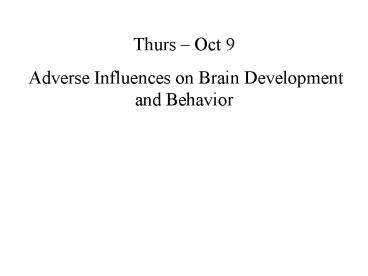Thurs Oct 9 - PowerPoint PPT Presentation
1 / 33
Title:
Thurs Oct 9
Description:
1. Criteria For Inclusion of Participants. Prospective Identification ... Accutane pill used to treat cystic acne. a synthetic Vitamin A (a retinoic acid) ... – PowerPoint PPT presentation
Number of Views:110
Avg rating:3.0/5.0
Title: Thurs Oct 9
1
Thurs Oct 9 Adverse Influences on Brain
Development and Behavior
2
- Variables Governing Susceptibility
- Gestational Age at Exposure
- Genotype
- Characteristics of Agent
- Mechanism of Action
- Amount
- Route
3
- Research Designs and Issues Important in
Associating Prenatal Events with Postnatal
Outcomes - 1. Criteria For Inclusion of Participants
- Prospective Identification
- Reliable Pre - Peri- natal History
- Known Socioeconomic Status
- - Parental Occupational Level
- - Parental Educational Level
4
- 2. Criteria For Exclusion of Participants
- Mental Retardation in either Parent
- Prenatal Exposure to other Harmful Agents
- Chromosomal/Genetic Abnormality
- Brain Damage Sustained in Childhood
- - illness
- - injury
5
3. Need for Comprehensive Assessment of Physical
Features A thorough morphological exam is done
to detect dysmorphology abnormalities of
structure
6
(No Transcript)
7
(No Transcript)
8
- 4. Need for Comprehensive Assessment of Function
(to capture effects on any brain area) - Medical status
- General Mental Ability
- Sensory Ability
- Sensory/Perceptual/Motor Integration
- Motor Coordination
- Planning/Organization/Attention
- Language Based Abilities
- Reasoning Ability
9
Teratology - study of abnormal development Teratog
en - an environmental agent that causes abnormal
development Neurobehavioral Teratology study of
abnormal brain or behavioral development
resulting from an environmental exposure
10
- Known Human Neurobehavioral Teratogens
- Rubella
- Cytomegalovirus
- X-Irradiation
- Retinoic Acids
- Anticonvulsant Drugs (Phenytoin Valproic
Acid Phenobarbital Carbamazepine) - Drugs of Abuse (Alcohol Heroin Methadone
Methamphetamine Cocaine)
11
- Known Neurobehavioral Teratogens (continued)
- Methylmercury
- Lead
- PCBs
12
- Causes of Behavioral Dysfunction
- Reduced Number of Neurons
- Migration Defects
- Abnormalities of Cytoarchitecture
- Neurochemical Disturbances
13
- The individual agents/drugs selected allow
certain principles to be illustrated - Some things are evident at birth some are not.
- Generally, neurobehavioral teratogens impair the
function of more children than the number
affected with malformations our techniques are
not yet good enough to detect structural brain
abnormalities at birth. - Some agents do not cause structural
malformations, but do compromise behavior. - Agents that are harmful during pregnancy may also
be harmful during childhood brain development.
14
Adverse Outcome Due to Prenatal Rubella (From
Alford, Pass, and Stagno, 1983) 30 of infants
are symptomatic at birth Heart
Defects Microcephaly Deafness Growth
Retardation Retinopathy Cataracts
15
Rubella continued Of those symptomatic at birth,
80 show neurobehavioral problems in
childhood Hearing loss Language
disorders Visual abnorm. Motor
disorders Hormonal abnorm. Cognitive
dysfunction Dental Defects Emotional disorders
16
Rubella continued Of the 70 of infants who are
not symptomatic at birth, 70 show Hearing
loss Language disorders Visual abnorm. Motor
disorders Hormonal abnorm. Cognitive
dysfunction Dental defects Emotional disorders
17
Teratogenic Effects of Radiation
- Mental retardation
- Highest risk during major neuronal migration, on
8-15 weeks. Incidence increases with dose. At 1
Gy fetal dose 75 experience severe retardation - At 16-25 weeks, fetus shows no increase in mental
retardation at doses lt 0.5 Gy - IQ - Risk factor associated with diminution of IQ
is 21-33 points at 1 Gy to fetus on 8-15 weeks. - Microcephaly
- observed in 30 children of 1000 exposed in
Hiroshima and Nagasaki pregnant women - the effect lt0.3 Gy is not significantly
different of control
18
- Accutane pill used to treat cystic acne
- a synthetic Vitamin A (a retinoic acid)
- isotretinoin
19
- Accutane interferes with the development of
- Central Nervous System
- Craniofacial structures
- The Heart
- The Thymus and Parathyroid Glands
- Other organ systems
20
- Embryonic Exposure to Accutane (Isotretinoin)
- Spontaneous Abortion (40)
- Major Malformations (35)
- Prematurity 16
21
(No Transcript)
22
(No Transcript)
23
- CNS Abnormalities
- Cerebellar Hypoplasia (small cerebellum)
- Absence or Reduced Size of the Cerebellar
Vermis (a part of the cerebellum) - Ventriculomegaly (4th) enlargement of the 4th
ventricle - Cranial Nerve Abnormalities (optic oculomotor)
24
- Additional CNS Abnormalities (visible on
autopsy Lammer and Armstrong, 1991) - Pons
- Medulla
- Thalamus
- Hippocampus
- Heterotopias in Frontal Cortex
- reduced myelination
25
Figure 1. Mental ability of children exposed to
isotretinoin during embryonic development.
26
- Prenatal Exposure to Anticonvulsant Medications
- Major malformations
- Craniofacial Abnormalities
- Digit Hypoplasia
- Reduced learning ability
27
(No Transcript)
28
(No Transcript)
29
- Diagnosis of Fetal Alcohol Syndrome
- Minimal criteria
- Abnormalities in three areas
- Prenatal and/or postnatal growth retardation
- Central nervous system involvement
- Characteristic facial dysmorphology
30
(No Transcript)
31
(No Transcript)
32
When criteria for effect are just disturbances in
CNS function, affected is much higher.
33
CNS Dysfunction Infants feeding problems
sleep problems irritable difficult to soothe
abnormal muscle tone Permanent reduced
intelligence behavioral abnormalities (reduced
inhibitory control social difficulties
increased activity) Alcohol is the 1
preventable cause of mental retardation.































